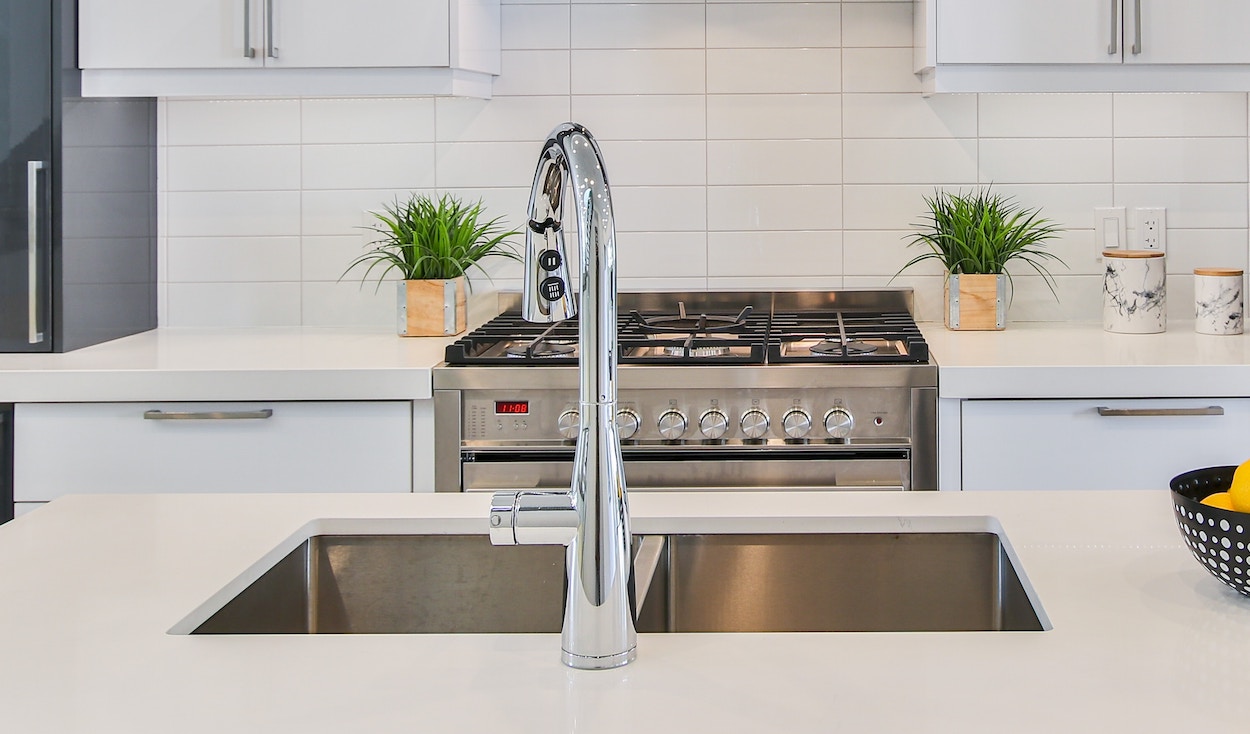Are Boiling Water Taps Eco Friendly?

As a society, we're becoming increasingly conscious of our impact on the environment.
From our transport choices to our dietary preferences, we're continuously looking for greener alternatives.
But have you ever considered the ecological footprint of your kitchen appliances?
This brings us to the topic of boiling water taps.
These handy devices have revolutionised our kitchens, providing instant hot water at the flick of a switch.
But how do they fare when it comes to environmental friendliness?
In this article, we'll delve into the eco-credentials of boiling water taps, exploring their energy consumption, efficiency, and overall impact on the environment.
- Related Post: Are Instant Hot Water Taps Energy Efficient?
Are Boiling Water Taps Eco Friendly?
Boiling water taps, also known as instant hot water taps, have been gaining popularity for their convenience and modern appeal.
However, their environmental impact is a concern that's often brought up, with people wondering, "Are boiling water taps eco-friendly?"
The answer is somewhat complex as it relies on various factors, including the tap's design and the user's habits.
Firstly, many boiling water taps are designed with energy efficiency in mind.
They work by maintaining a small tank of water at near boiling temperature, ready to be dispensed instantly.
While this may sound energy-intensive, these devices are often well-insulated, minimising heat loss and thus saving energy over time.
In terms of water wastage, boiling water taps can be much more efficient than traditional kettles or hot water systems.
They dispense the exact amount of water required, meaning there is no wasted water as you might find when overfilling a kettle or waiting for the hot tap to run warm.
However, if the tap isn't used frequently or is left on when not in use, it can consume unnecessary energy to maintain the water's high temperature.
Some models address this issue with an energy-saving mode that lowers the water temperature during periods of inactivity, further enhancing their eco-friendliness.
Moreover, the lifespan and disposal of the unit should also be considered.
Higher quality models that are durable and have longer lifespans will be more eco-friendly in the long run.
Additionally, brands that offer take-back programs for recycling or disposing of their products responsibly add to their eco credentials.
So yes, boiling water taps can be eco-friendly, particularly when used correctly.
However, it's essential to choose a high-quality, energy-efficient model and be mindful of your usage habits to minimise your environmental impact.
Click here to view our range of Instant Boiling Water Taps for sale.
Are Instant Boiling Water Taps More Energy Efficient Than Kettles?
The debate on whether instant boiling water taps are more energy-efficient than kettles is an intriguing one.
Let's take a look at the factors involved:
- Amount of Water Heated: People often boil more water than they need in a kettle, leading to wasted energy. On the contrary, boiling water taps dispense exactly the amount of water you need, reducing unnecessary energy usage.
- Heat Retention: Instant boiling water taps have insulated tanks, ensuring minimal heat loss. This means that once the water is heated, it retains its temperature for a longer period with less energy use, compared to a kettle which cools down rapidly after boiling.
- Frequency of Use: If you often need small amounts of boiling water throughout the day, a boiling water tap can be more energy-efficient. Heating small quantities of water several times in a kettle can consume more energy.
- Standby Energy Consumption: Modern boiling water taps are designed to be energy-efficient, even in standby mode. While kettles consume zero energy when not in use, the minimal standby energy consumption of an efficient boiling water tap can be outweighed by the energy saved during operation.
- Savings Over Time: While the initial cost of a boiling water tap is higher than a kettle, the energy efficiency can lead to savings in electricity costs over time.
Therefore, it's safe to say that instant boiling water taps can be more energy-efficient than kettles, especially in households that frequently require hot water.
However, the actual energy consumption and efficiency can vary based on specific models and usage patterns.
Always consider these factors and choose the option that best suits your needs and habits.
- Related Post: Should I Turn My Boiling Water Tap Off at Night?
Do Boiling Water Taps Use Less Water Than Using a Kettle?
When it comes to water usage, boiling water taps can indeed be more efficient than kettles.
Traditionally, people tend to fill the kettle with more water than they actually need, leading to wasted water.
With a boiling water tap, however, you can dispense exactly the amount of hot water you need, right when you need it.
Whether it's a mug full for a hot drink or a pot full for cooking, you can control the amount with precision.
Furthermore, boiling water taps can reduce water wastage in a less obvious way.
Sometimes, when we boil water in a kettle, we don't use it immediately, allowing it to cool down.
When we need hot water again, we have to reboil, wasting not only water but also energy.
With a boiling water tap, the water stays hot in the insulated tank, ready for immediate use without the need for reboiling.
However, keep in mind that boiling water taps have a small amount of water that is wasted when heating up, and also they need to keep a tank of water hot at all times.
This will lead to some water wastage but it is generally less significant compared to the wastage from using a kettle.
So, if used correctly, boiling water taps can indeed help reduce water wastage compared to using a traditional kettle.
Advice from a Seasoned Kitchen Fabricator and Installer
With years of experience in kitchen fitting and manufacturing, I've seen a significant shift in the appliances people choose for their kitchens.
Of these, one of the most significant in recent times is the rise of the instant hot water tap.
I've fitted countless models into various kitchen styles and sizes and the benefits they bring are truly impressive.
- Convenience: One of the major benefits of instant hot water taps is the convenience they offer. Having immediate access to boiling hot water at the turn of a tap saves significant time and hassle in the kitchen, whether you're making a quick cup of tea, preparing a pot of pasta, or needing hot water for cleaning.
- Energy Efficiency: While it may seem counterintuitive, instant hot water taps can be incredibly energy efficient. Traditional methods of obtaining hot water, such as boiling a kettle or heating water on a stove, often involve heating more water than is needed. In contrast, an instant hot water tap provides the exact amount of hot water required, eliminating wastage and saving energy in the process. Plus, the tanks of these taps are well-insulated, meaning they retain heat effectively and require less energy to maintain the water temperature.
- Water Conservation: Similar to energy efficiency, these taps also conserve water by dispensing only the amount needed. This reduces the waste caused by overfilling kettles or waiting for the tap to run hot.
- Safety: Boiling water taps often come with child-safe features such as safety locks and cool touch exteriors, providing an added layer of protection to households with young children. Furthermore, by eliminating the need to carry kettles full of boiling water, they reduce the risk of scalding accidents.
- Aesthetic Appeal: From a design standpoint, instant hot water taps offer a sleek, modern aesthetic. Available in a variety of finishes, they can be chosen to fit seamlessly with your kitchen decor.
- Space-Saving: By combining the functionality of a regular tap and a kettle, instant hot water taps free up valuable counter space, contributing to a less cluttered and more efficient kitchen environment.
In conclusion, as an experienced kitchen fitter, I can say that instant hot water taps are a worthwhile investment for most modern kitchens.
They blend convenience, energy efficiency, safety, and style in one package, enhancing the functionality of your kitchen while also potentially saving on your energy bills.
Final Notes On If Are Boiling Water Taps Are Eco Friendly
In the contemporary push towards green living, we are all looking for ways to make our homes and habits more sustainable.
As part of this eco-friendly mission, the efficiency and environmental impact of everyday appliances are becoming increasingly important.
In this context, boiling water taps – a relatively recent addition to our kitchens – have raised some questions.
Are they as eco-friendly as they are convenient?
This article has explored the ins and outs of boiling water taps, evaluating their energy consumption, water usage, and overall environmental impact.
From energy-efficient designs to precise water dispensing, these taps can indeed be a green choice for your kitchen, especially when compared to traditional methods like using a kettle.
However, like all appliances, their eco-friendliness greatly depends on how they're used.
Regular use, turning the tap off when not needed, and leveraging energy-saving features where available can all help optimise the eco-credentials of your boiling water tap.
As always, it's important to research and choose a model that suits your needs, habits, and environmental considerations to make the most out of your investment.


